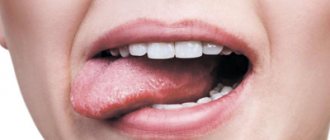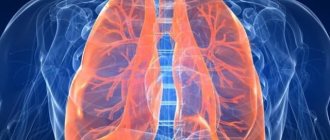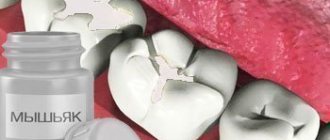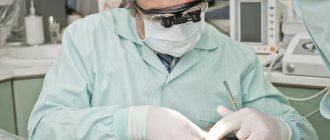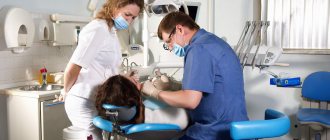What is gnathology?
The human dental system consists of the jaw bones, muscles, ligaments, teeth, tongue, temporomandibular joint (TMJ) and nerves. The work of all these organs, as well as their interaction with each other and with the body as a whole, is studied by gnathology. The proper functioning of our chewing system depends on the condition of the spine, on posture, on how a person breathes, and on many bad habits we have acquired. And, conversely, a downward influence is also possible: problems in the temporomandibular joint can result, for example, in pain in the legs.
Restorative dentistry has made amazing strides in recent years. Dentists - orthopedists, orthodontists, and estheticians have learned to literally recreate amazingly beautiful smiles that can change a person’s life. However, if during treatment the doctor does not take into account the myofunctional disorders the patient has, then the result of the work will not bring satisfaction to any of them. It is possible to achieve high aesthetics and improve the functioning of the dentofacial apparatus only if we consider each restored tooth not as a separate unit, but as an integral part of the whole organism.
Gnathology is closely related to such relatively new specialties as osteopathy, kinesiology, as well as neurology and otolaryngology. Dental gnathologists work closely with these specialists.
Why does TMJ dysfunction develop?
The reasons for the development of dysfunction can be very different - from the position of the teeth to pathologies that have nothing to do with dentistry. Pathological changes in the mandibular joint can be provoked by:
- variable changes in the psyche (neurosis, constant stress);
- problems with the autonomic nervous system (heart rate irregularities, blood pressure surges);
- parafunction of masticatory muscles;
- injuries in the TMJ area;
- episodic microtrauma of the joint caused by irrational or poor-quality prosthetics;
- traumatic occlusion;
- incorrect dental treatment (fillings that are too high);
The cause of TMJ dysfunction can also be untimely restoration of lost teeth, except for “eights”.
What is the temporomandibular joint, and how is it related to the functioning of our dental system?
The temporomandibular joint, or TMJ for short, is a two-part joint that attaches the lower jaw to the bones of the skull. It is responsible for the proper functioning of the lower jaw, for the processes of opening and closing the mouth and chewing food. Any changes in the joint lead to toothaches and discomfort in the neck and back of the head, as well as clicking in the joint, tinnitus and other symptoms.
Incorrect functioning of the TMJ is associated not only with bad childhood habits, but also with numerous unnerving situations. Due to frequent stress, the masticatory muscles are in constant tension. As a result, teeth can wear out or become loose, the articular head is displaced, the neurovascular bundle is pinched, severe pain occurs, and the person cannot chew food normally. We are so immersed in our problems that we don’t even notice how we constantly clench our teeth and learn about this bad habit only in a specialist’s office.
What does a gnathologist treat?
Analyzing all existing health problems, a gnathologist determines cause-and-effect relationships between phenomena and offers optimal treatment for such diseases:
- TMJ dysfunction, articular disc displacement;
- pathological occlusion;
- bruxism or generalized abrasion.
The specialist can determine the interalveolar height (the distance between the bone ridges of the jaws), restore the correct guidance of the jaw from below and recreate the correct incisal and canine separation.
If the lower jaw constantly cramps, only a gnathologist can determine the causes of the unpleasant phenomenon and plan a course of treatment for the dental apparatus. The specialist will plan muscle relaxation therapy using splints and a disconnecting mouthguard.
How can you understand that pain and spasms in the jaw area are associated specifically with the TMJ?
Most often, with disorders of the TMJ, people go to the dentist with complaints of toothache. And only an experienced dentist can determine that this patient needs to undergo a full examination by a gnathologist.
When diagnosing disorders in the functioning of the TMJ and the dental system as a whole, a number of devices are used that evaluate the functioning of the muscles and joints, determine exactly how the teeth close, and help relieve spasms. The patient must be examined using all of the above equipment in order to identify and eliminate the cause of anomalies that have arisen in this area.
Differential diagnosis
Since the symptoms described above are similar to the manifestations of pathologies that are in no way related to gnathology, the doctor additionally conducts a differential diagnosis. A patient who comes to see a gnathologist may develop the following serious pathologies:
- myocardial infarction (pain radiates to the neck, lower jaw and shoulders);
- otitis media of unknown origin (severe jaw pain and hearing loss);
- cerebral circulatory disorders (dizziness, flashing “flies” before the eyes, nausea);
- thoracic and cervical osteochondrosis (pain is localized in the same areas);
- pinching of the facial nerve (unilateral hypertonicity of the facial muscles and tissue swelling);
- complications of pathologies of teeth and gums (inflammation and limitation of mobility of the lower jaw).
To exclude an error in diagnosis, the gnathologist carefully examines the patient’s medical history and identifies possible relationships between a person’s chronic diseases and the symptoms that appear.
What techniques do you use to eliminate TMJ dysfunction?
In addition to special equipment, mouth guards and trainers help relieve tension and restore muscle function. That is why specialists prescribe them to patients before or after the installation of orthopedic structures. In addition, trainers and mouthguards also allow you to optimize and shorten the process of orthodontic treatment, especially when it comes to children. Previously, it was believed that a child with a narrow jaw could not avoid crowded teeth. Modern experts have refuted this statement and proved that jaws can “adjust” to any size of teeth, provided that nothing interferes with their growth. However, improper functioning of the muscles can stop the development of the jaws, and they will have to be expanded with the help of braces or complex treatment. A gnathologist helps you tone your muscles in a timely manner and avoid the appearance of serious curvatures. And this applies not only to children, but also to adults, with the only difference being that for the latter, the process of achieving the desired result will take a little longer.
Another way to restore proper muscle function is myogymnastics, a special program that stimulates the formation of a correct bite and its correction, preventing relapses after orthodontic treatment. The specialist will prescribe which exercises you will perform.
The role of a specialist in preparing for reconstructive treatment
Modern dental clinics follow a multidisciplinary approach to preparing patients for dental prosthetics. Since the success of this complex procedure depends on many factors, it requires the coordinated work of a whole team of professionals, including a specialist in the field of gnathology. The installation of a prosthesis should not change the normal functioning of the dentofacial apparatus and lead to the patient experiencing discomfort or chronic pain. Not every clinic employs such specialized specialists as gnathologists, but every highly qualified dentist must have basic knowledge in this industry and be guided by it when selecting a treatment method for the patient.
Should all dentists have knowledge of gnathology?
If you are seeing a qualified doctor, you do not have to consult a gnathologist before going to see him. Gnathology is the science of the coordinated work of the dental system, so every specialist working in a dental clinic has an idea about it. The doctor applies knowledge in the field of gnathology even when installing a filling. He doesn’t just “cover up” the carious lesion, but restores the affected area with the help of special materials, which he gives a certain shape in accordance with the bite.
In what cases may you need a doctor's help?
Despite the fact that a gnathologist is a rather rare specialty, this specialist can help in solving many medical problems. For the proper functioning of the dental system, the following factors are necessary:
- regular oral hygiene;
- proper nutritional culture;
- absence of bad habits;
- absence of injuries to the facial part of the skull;
- no problems with posture;
- absence or timely treatment of chronic inflammatory or infectious diseases of the oral cavity;
- properly performed dental prosthetics;
- timely correction of bite;
- absence of pathologies of the central and peripheral nervous system and others.
If the patient has deviations in at least one of the above factors, then the risk of dysfunction of the dentofacial apparatus is quite high. It is these patients who need consultation with a gnathologist before undergoing implantation, prosthetics or installation of a brace system.
Basic diagnostic methods
Since a gnathologist works with patients who have mixed pathology affecting several body systems, there are more than enough diagnostic methods in gnathology. To make an accurate diagnosis, gnathologists use:
- X-ray. Allows you to determine the presence of organic changes in the structures of the dentofacial apparatus;
- MRI, CT. More informative methods allow one to assess the condition of tissues and the presence of even minor pathological changes in them.
- Orthopantomography. Used for a comprehensive assessment of the condition of the upper and lower jaw, the presence of changes in bone tissue.
- Dopplerography. To study the condition of blood vessels and diagnose disturbances in the blood supply to the structures of the dental system.
- Electromyography. Allows you to evaluate the function of the muscular system.
Also, when making a diagnosis, consultations with related specialists may be prescribed. The patient is examined by a neurologist, vertebrologist, and if necessary, a consultation with a maxillofacial surgeon is scheduled (in the presence of injuries or developmental anomalies). Also, in some cases, problems with the dental system can be psychological in nature and be provoked by chronic stress, which is accompanied by prolonged spasm of various muscle groups.
How often should you visit a gnathologist?
Of course, you shouldn’t visit a gnathologist too often: a regular dentist can handle a regular preventive examination, especially if the patient does not have the above symptoms or any other complaints of a similar nature. However, it is still recommended to consult this specialist if you are facing such an important event as installing braces or dentures. In this case, the effect of the manipulations performed will satisfy you as much as possible.
pixabay.com/



